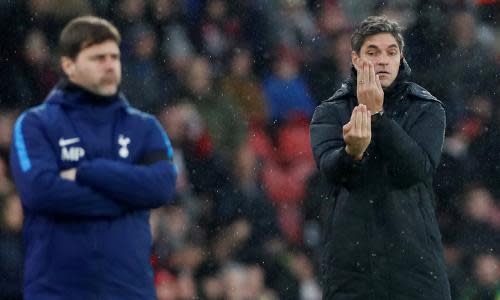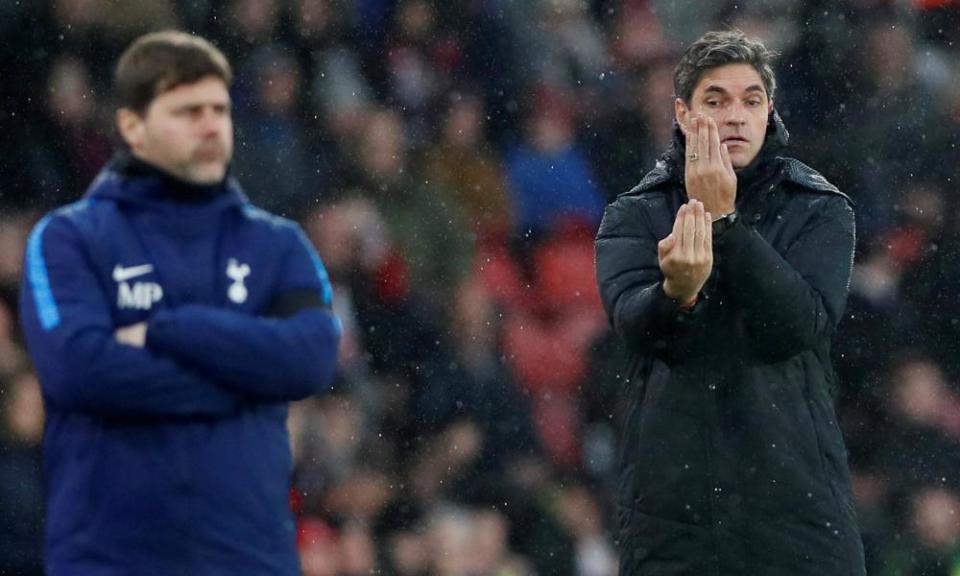A transfer window for managers? It will happen but for the wrong reasons
‘In Argentina we say that the job is the electric chair,” Mauricio Pellegrino explained last week of the manager’s gig. “It is not easy to stay in the seat.” The fact that it is easier to stay in an electric chair than almost any other seat – historically, occupants have tended to be strapped to it at multiple points – is irrelevant. We know what the Southampton manager means. And if we don’t, the statistic that eight out of 20 of this season’s Premier League managers had been shown the electrodes by mid-January should bring home the reality of the bronco ride.
As the player transfer window closes, then, there are the familiar worries that things may be amiss. So out of control is the Least Continent League in the World TM deemed that some have revived talk of a managerial transfer window, to temper clubs’ mad pursuit of the short-term managerial bounce. This, it is thought, would force owners to stop chasing waterfalls, and stick to the rivers and lakes they should get used to.
Except, alas, it wouldn’t. That moment in the Premier League’s storied evolution has long passed. The football industrial complex, in which the media is but one heavily invested player, is well past the stage where a change of such small scale could halt its onward march. It’s like any number of sci-fi creations who can have a limb blown off, only to regroup and regenerate it having barely broken their stride.
You might as well argue against gravity as resist the reality of the league – a dysfunctional telenovela where story arcs are sliced and diced in the bitterest of ratings wars. It is, as the ancient saying goes, a messy bitch who lives for the drama. The media largely wish it to be that way, whatever they pretend, while the clubs themselves are openly in pursuit of a different kind of content than mere football matches.
Manchester United’s managing director, Richard Arnold, cheerfully calls his club “the biggest TV show in the world”, seeing his commercial competitors as movie franchises and megastars. “If you think about why people watch soap operas,” he explained a couple of years ago, “it’s what will happen next. That uncertainly is part of what makes sport exciting.”
READ MORE: Deadline day - all the rumours and done deals
If a managerial transfer widow ever happens, then, it will only be to ratchet up the drama, rather than defuse it. Already, you may be struck by the nagging sense that the entity under most immediate pressure to “deliver” on transfer deadline day is Sky Sports News itself. Those guys would actively welcome a new layer being added to the merry-go-round.
After all, like Britain or Creme Egg sizing, Jim White’s schtick is widely regarded as something that was better in the past. These days, it’s almost as if people would rather watch actual football than people speculating about medicals in a wet car park. Although there are seven Premier League fixtures on Wednesday night, there is a vestigial sense that deadline day should, in some non-mathematical sense, be outrating them. As Giles Smith reminded readers in the Times this week, this was the sort of scheduling clash that in 2012 led to Sky Sports News claiming the deadline day drama would be “played out against the backdrop of a busy night in the Premier League”.
The backdrop! That arse-about-tittery is the Holy Grail of the content era, however tired deadline day’s model of it may be. A managerial transfer window would be a great trick to revive it, and on that basis alone you should expect it to become a reality at some point.
Neville’s learning curve

To St George’s Park, where Phil Neville’s otherwise incident-free unveiling as England women’s coach saw him wrongfooted by the question of who is top scorer in the Women’s Super League.
As a matter of personal taste, I am not a huge fan of gotcha questions, though I suppose occasionally they do serve a purpose. For instance, it was instructive to be shown George W Bush couldn’t name the Pakistani leader before he was elected president. You couldn’t say you hadn’t been warned of what would come after. Of course, Dubya is now regarded the last great internationalist US president, so the FA will be hoping that the Mark Sampson era isn’t subsequently thrown into sympathetic relief by an even bigger HR shitshow.
Neville was mostly at pains to suggest that he’s a quick study and could apply this gift to women’s football (and, presumably, to conversational feminism). “I don’t know every facet but I will,” he promised. “When I went to Spain I knew three Valencia players. I didn’t know the language, didn’t know La Liga. But after three months I knew the language and every player and everything about Spain.”
(Probably for the best that no one took the opportunity to ambush him at this point with a pop quiz, in Spanish, about anything from Franco to the youth unemployment crisis. I sense he’d have been desperate to get back on to the subject of highly obscure She Believes Cup stats after that.)
The main takeout seemed that this appointment will be, in the parlance of our times, a journey. In the weeks and months ahead, we are being offered nothing less than the opportunity to behold The Wokeing of Phil Neville. Or as Bill Clinton once put it with an ominous smile: “If Mr Bush is president he will soon learn their names.”

 Yahoo Sport
Yahoo Sport 













































